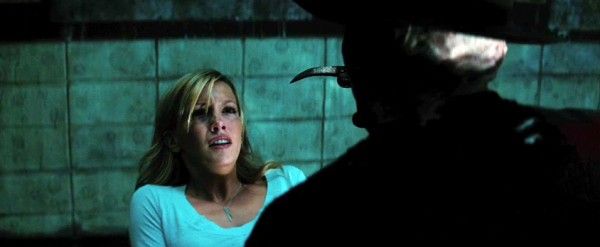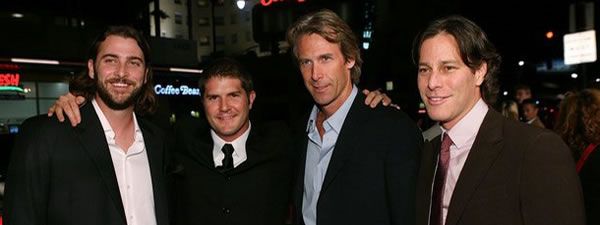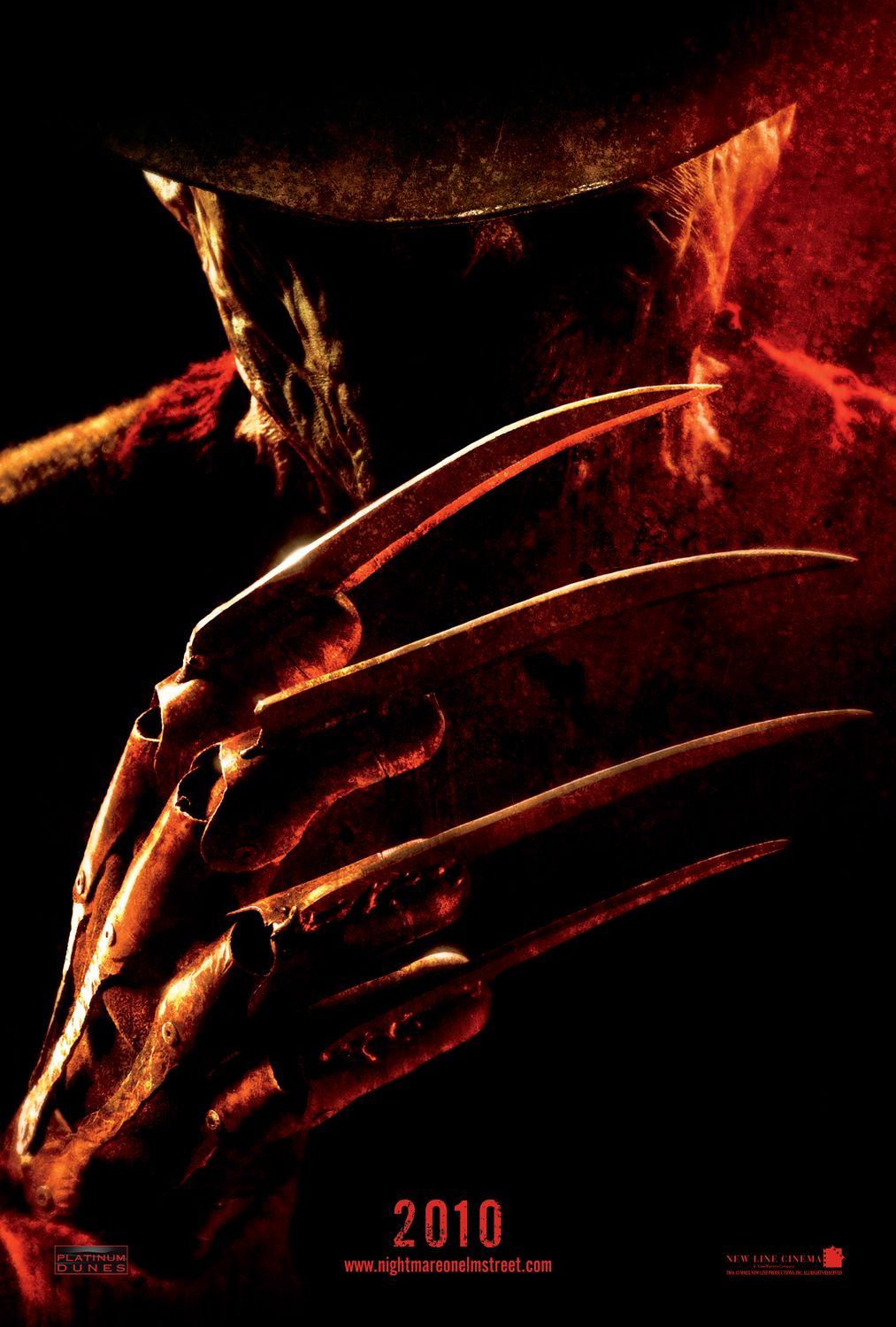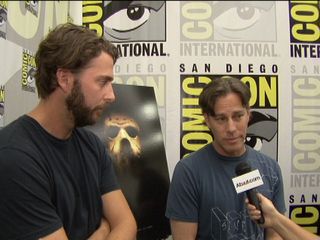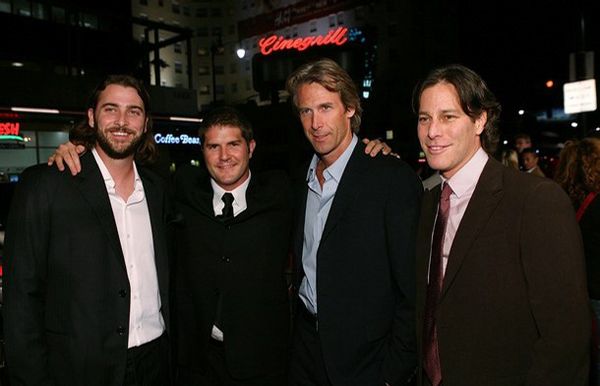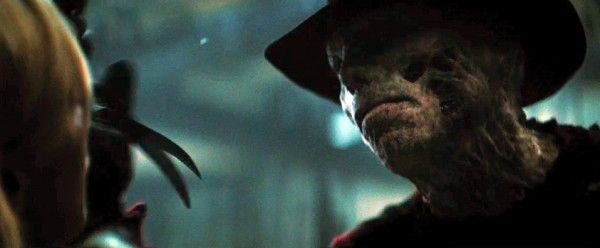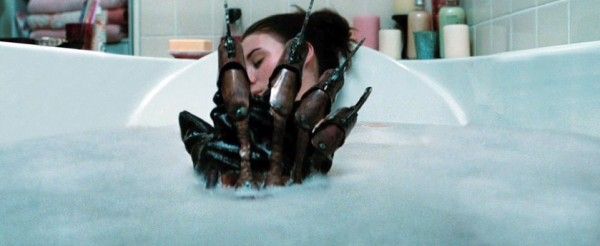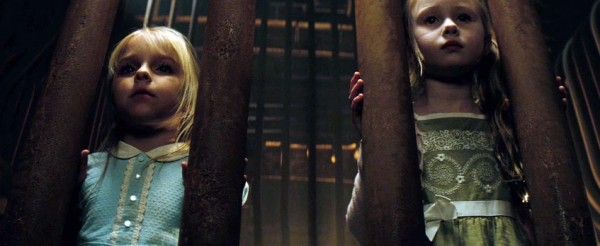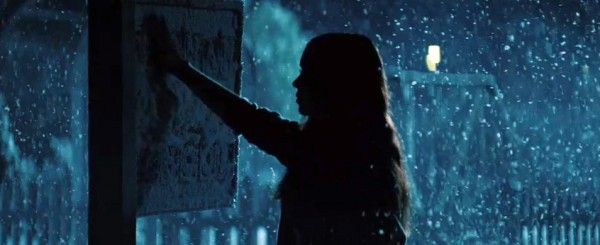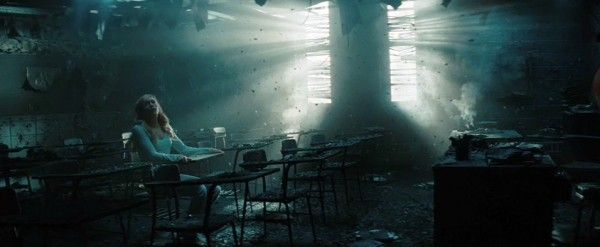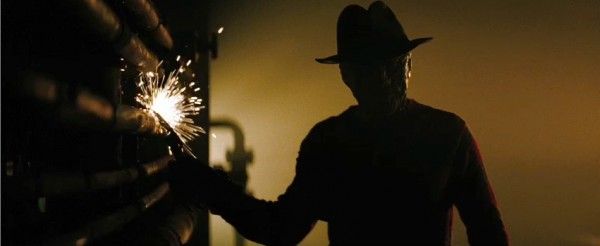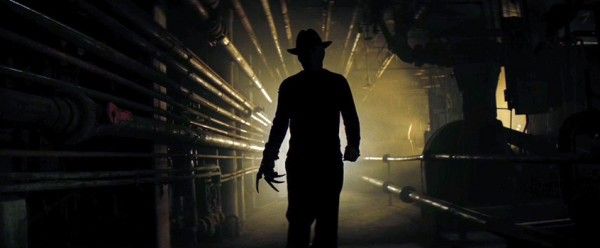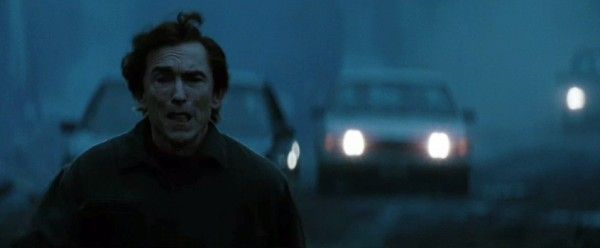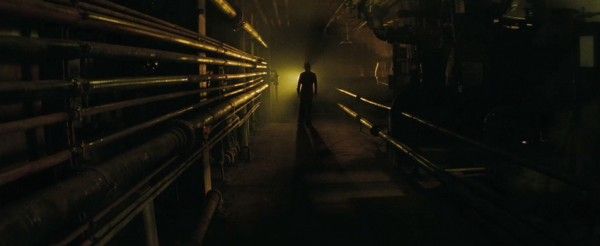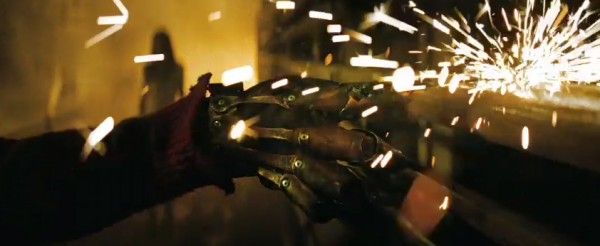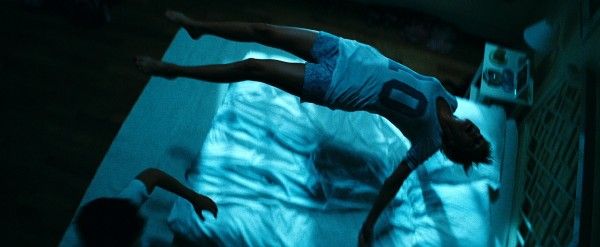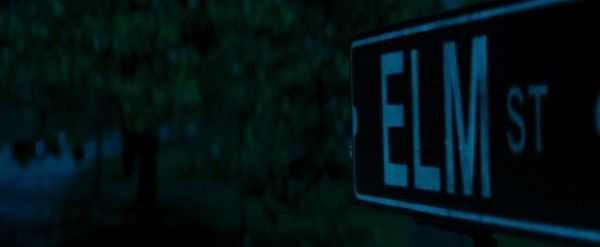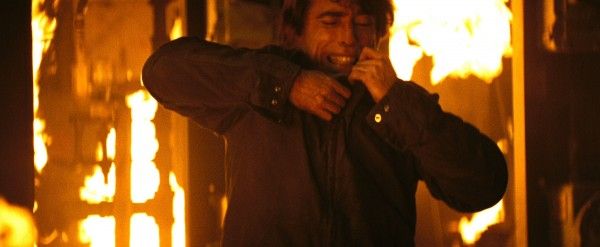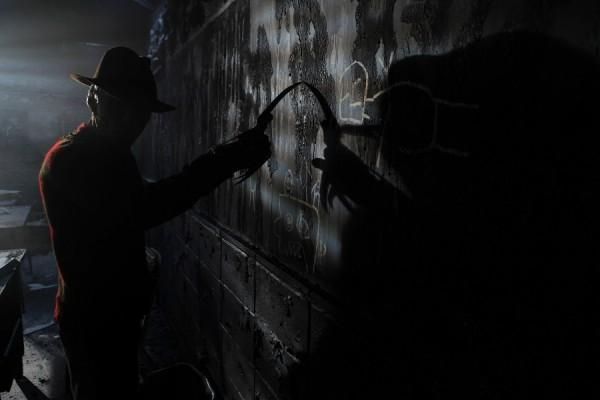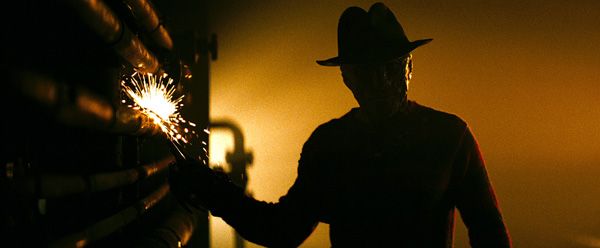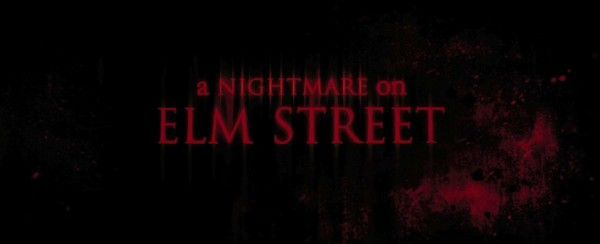While you might not know producers Andrew Form and Bradley Fuller by name, you've definitely seen their work. As two of the three owners of Platinum Dunes (along with Michael Bay), they've produced The Texas Chainsaw Massacre, The Hitcher, The Amityville Horror, The Unborn, Friday the 13th (2009), and for the last year, they've been hard at work bringing Freddy back to life in New Line's reboot of A Nightmare on Elm Street.
Back when the production was filming in Chicago last June, I was invited to the set - along with a few other online journalists. While there I was able to participate in a very extended interview with the two producers. During the interview, they talked about why they wanted director Samuel Bayer, how hard was it to land the Freddy franchise, why did they want to reboot it, why Jack Earle Haley, and so much more. If you're curious what goes on behind the scenes when trying to make a movie, it's a fantastic read.
Hit the jump to read the transcript or listen to the audio:
As always, here's the audio of the interview. And if you've missed the teaser trailer for A Nightmare on Elm Street, watch it first and then read the interview:
-
*Note* Some of what they said about future projects must have changed since conducting this interview. Know this was recorded in June of 2009.
-
Q: Was this an easier experience getting through the rights and legal problems you guys faced on Friday, was it easier having Friday at your back to convince Warner Bros. and New Line?
Bradley Fuller: No, it definitely was not actually. It definitely was one that we pursued for a couple years. New Line thinks that this is like their Batman, basically, and Freddy Krueger is very important to them, obviously. I don't think that, I mean we were trying to get these rights before Friday the 13th and feet were dragging for a long time and it really wasn't until Friday the 13th was done and in the can and they felt positive about it that they finally decided "yah let's go with these guys." But it was torturous. The only time it was easy for us with rights was with The Amityville Horror and that was just MGM owned it, nobody cared, no one cared about horror really at that point and in a real way and that was just an easy hand off because that was just a property that wasn't earning any revenue for them. Every other time it feels like we're struggling.
Q: Because Freddy Krueger was the guy who practically put New Line on the map.
Bradley Fuller: Yes
Q: Was this all during when Bob Shay was on the way out? Did Bob Shay have any say in this or...?
Bradley Fuller: That was kind of part of the issue. When we started negotiating, New Line was a wholly owned New Line and then when the whole Bob Shay went down, the brakes came out and there really wasn't anything to do on this for about six months. And then I think that what happened, I suspect and I don't know this for a fact, Warner Bros. Said to Toby Emmerick "what kind of movies are you gonna be making? You guys do horror, so you should probably do horror." This title was there and it was some we were down the road on. They had actually already hired Wesley Strict before we came on. So, it felt like the natural one to say "ok let's go with that one" and I think these guys felt we did a good job with Friday the 13th.
Q: Why Nightmare in the first place; you guys had been pursuing for a long time so what was it about Nightmare that sort of attracted you guys in the first place?
Bradley Fuller: Well, we all love Freddy Krueger and we've always talked about it and wanted it and begged for it.
Q: So, were there certain things that you always had imagined for this film that have made it from back in the day when you first started pursuing it to actually filming it right now?
Bradley Fuller: Well something that our company has always strived to do, is we try to hire very visual directors to make our films and make them look a certain way. And the dreams have always been very enticing to us because certainly with a visual director you put that in the heads of someone who can do something amazing visually and it heightens what that movie is. For us it was always about finding the right guy who can make those dreams just feel amazing and visually more than anything anyone had seen in the original film.
Q: Do you have a preferred name for what you'd like people to call this; is it a reboot, is it a remake, is it a rehashing?
Bradley Fuller: We haven't had that discussion yet so in an absence of that discussion, we're going with the same title.
Q: But I mean in terms of how you guys want to view it. Do you want it to be thought of as a reboot or as a remake?
Bradley Fuller: You know the way we answer that question is the same thing we've done with the other titles we've been lucky enough to have where we take certain things about the original title that we liked...
Andrew Form: This one's more like Chainsaw. It's not like Friday the 13th where we picked through a whole bunch of movies. I think this one holds truer to the original Nightmare.
Q: So you're looking at this as the real events that actually happened.
Bradley Fuller: No, I wouldn't say that.
Q: You know what I mean by that?
Fuller: I do know what you're getting at. That's not really the way we've been looking at we just kind of went off the same general story and made some changes to it.
Andrew Form: When I say Chainsaw I mean as far as following the original.
Fuller: Our version of Texas Chainsaw versus the original version of Texas Chainsaw. That's what Drew's referring to.
Andrew Form: Right, because Friday the 13th was not a remake of the original. That was 1, 2, 3 pieces from a bunch of movies.
Fuller: We're not borrowing, liberally, from all the movies to make this one. This is not going to be the best of Nightmare on Elm Street.
Q: So you guys aren't going to get in to that mythology of Amanda Krueger and some of the dream warrior aspects, you know. You're not cherry picking those ideas.
Fuller: No, not at all.
Q: Well that's sort of interesting because with Friday you sort of distilled it down to what the essence of a Friday movies is. I feel like the popular conception of Freddy Krueger might be a bit different than what you guys are going for here because Freddy Krueger, popularly, is Henie Youngman as a serial killer. He's witty; he's a joke guys. And you're not going that way.
Fuller: No, but he wasn't that way really in the first couple and that's what we're sticking to. We've never been attracted to a jokey antagonist because it feels less scary and less real. As you guys will see tonight, Freddy Krueger looks very different. He looks like a real burn victim and that's what's important to us and he's not witty. He's a fucked up guy.
Q: Is there gonna be jokes that sneak in there?
Form: Ya, there's stuff in there.
Fuller: But the jokes are never with Freddie, necessarily. You have a bunch of kids...
Form: We heard one a few nights ago out of him. A little bit.
Fuller: Yes, but it's not what you think. When you say a joke, it's not what you're thinking.
Form: It's not like "are you ready for primetime;" He doesn't say stuff like that, but he definitely screws with the kids.
Q: Are there any lessons that you have learned from the success of Friday the 13th that you're sort of applying in terms of the tone of the film?
Fuller: Yes. There will be no nudity in this movie.
Form: The tone of this film is so different from Friday. Like Brad was saying, it feels...it's darker. I think a Friday the 13th movie like we made was really fun. You know, sex, drugs, and rock and roll and I think a Nightmare movie is not that. So I think, we knew going in that the tone for this film would be much different than a Friday the 13th film.
Q: Darker than Texas Chainsaw?
Fuller: It's in a different way. You're dealing with themes that are pretty horrible.
Form: I mean his back-story is very dark.
Fuller: I mean you guys saw the scene that we just shot. That's uncomfortable having a child with their dress up and seeing that.
Form: You know, a five-year-old girl with scratch marks on her back. There's a lot of that in this movie.
Q: Is that something the studio worries about. Do they say shy away from getting too serious because after all it's a fun horror movie or are they letting you go all the way?
Fuller: We agree on a script. We agreed on the script long ago. I don't think that anyone saw this characterized the way you're characterizing it, as a fun horror movie. I would characterize Friday the 13th as a fun horror movie and when we make another one of those that's what we're going on for that. With this, it's more about terrifying and unsettling and if we're lucky making people have horrible nightmares. I mean that's what the whole movies about and that's what we're aiming to do.
Q: Could you guys talk seriously about Freddy's look and where the line was? There had to have been a point when someone said, "ok that's too much like a real person."
Form: You're right. We had reference photos that we were going off of and you start with a bunch of pictures about how far you want to go. Even with skin color of a burn victim, how white the face looks or the pigmentation you have in it. I mean, there was definitely too far where I don't think you would even look at Freddy. You would turn away when he came on the screen. So, you dial it back a little bit and we did some tests...
Q: What was that too far? Was there like something where people just cut off?
Form: Yah, just full blown...
Fuller: burn victim. It's just so grizzly it's hard to look at. And it still is, it's just little things we tried to do. We wanted to make it so you could see Jackie's eyes a little bit better. I think some of the earlier versions had the skin so burnt you couldn't really see his eyes and see him emoting. We did some work with that.
Form: And choices like do you have eyelids or no eyelids.
Fuller: or ears.
Q: Did having the Two Face that they had in The Dark Knight in a PG-13 movie up the ante for you?
Fuller: Not so much in the rating, but in terms of...we all didn't see eye to eye on that. I thought that was pretty amazing what they did. Some people thought it was so amazing like it pulled you out of the movie because you were trying to figure out how they did it. So, we did pull back a little bit in terms of what we were doing because we didn't want the audience to stop and think how he got that way. But, we did certainly want to push what they did in the original because we have better materials.
Form: It did show us that we could take it that other step. It showed us that it doesn't just have to be appliances on a face.
Fuller: And you'll see tonight that we're doing a tiny bit of what they did in The Dark Knight. I don't want to give it away, so you'll see it when you see him and you'll understand exactly what I'm talking about.
Form: You'll see what we're doing to manipulate.
Q: Freddie's an interesting character because over time he's one of those characters who becomes the hero of the franchise. How sympathetic do you make Freddy in this picture especially some of the rumors we've heard that there are questions...
Fuller: Let's talk about the rumors. When you talk about the rumors, which rumors are you talking about?
Q: That there are questions as to whether Freddy actually did anything to these kids; whether or not he was wrongfully burned and thus makes him a more sympathetic character.
Fuller: I'll say this: we're starting over from the very beginning and I think that when parents are confronted with the notion that their child might or might not have been molested, that's an interesting part of the story for us. As you saw in the scene that we just shot, a kid can't really say yes or no and how is it happening. Our Freddy is definitely, and I don't think I'm letting the cat out of the bag, not a child killer. He probably has killed, but that's not our angle. Our angle is more of the molestation. And that makes it different and more horrifying I think.
Q: Well, how sort of sympathetic do you go with him?
Fuller: Well you don't want to make a child molester sympathetic, certainly. (laughs)
Q: Because that's why they skirted the child molester thing in the original. Because they wanted to sort of be sympathetic and you could sort of be on his side if he killed kids. If he did something else to kids you could never be on his side.
Fuller: You know it's a big story point and it's hard for me to just talk about. I don't know if I want to be that open about what it is. I'd rather you guys see it, because that does give away some things; in the way you're thinking and in other ways too and I want the journey for the viewers to be a little bit different.
Q: In terms of the mandates that New Line set, because I mean New Line has a whole legal team that watches how Freddy is handled. I mean when Universal Studios had their Halloween Horror Night, they actually sent a guy to see how Freddy was portrayed. Have you guys faced that on set where they were able to go: Freddy can't do this, Freddy can do that, Freddy can't do this, he's not allowed to do that, so on and so forth.
Form: No, we haven't felt anything like that. I mean, he's pretty much doin' what he wants.
Fuller: I will say this to you. New Line has been...the character is so important to them that I would say to you that we're on our fifth week of shooting and we were making refinements on the Freddy character up till last week. Wardrobe stuff, makeup stuff; we collectively are scrutinizing it to the Nth degree. It's not coming from a legal standpoint, it's from a quality standpoint and they've been all over us.
Form: From the sweater to the hat to the glove.
Q: Have you guys changed the glove?
Fuller: You'll see. It's cool, but it's THAT glove.
Q: Can you talk a little bit about the casting of Jackie. I remember there were a lot of rumors that he was going to be cast and then a lot of denials and then it ends up he is Freddy. So, how did that all come together.
Fuller: I think for Drew, Michael, and I, he was the only guy ever...
Form: And Sam.
Fuller: I'm sorry and Sam. But even before Sam was involved, he was always the guy we wanted to play Freddy and I think that New Line knew it also. I think that they wanted him. But, no one wanted to make that decision just out of the box so early. As soon as we got the job we said this is the guy that we want. We probably shouldn't have done that; we probably should have just kept quiet and looked around and saw what was out there. But, in our mind it's not like Jackie was in first place and these two other guys in second and third, it was Jackie or there's no movie in our mind. And New Line ultimately felt the same way. And I think Warner Bros. had Watchmen coming out and I think they wanted to see...
Form: And New Line had Little Children.
Fuller: New Line was certainly predisposed to him because he was amazing in that film. And I think when they saw him in Watchmen, too, that kind of sealed the deal. That character is pretty powerful.
Q: So Robert Englund was never discussed?
Fuller: Never discussed for this movie.
Q: Was it tough to get Jackie? Because the thing about coming onto a picture like this for an actor like Jackie is you're looking at a character who will now be identified with you potentially forever, just like Robert Englund will always be Freddie Kruger. Was it tough to convince his or was he psyched from the start.
Fuller: From a creative standpoint, it was not tough. Make those kind of deals where a major actor is signing on to do multiple movies are never easy deals to make. So, the difficultly was more in turns of that more than "How does Jack Earle Haley feel about playing Freddie Kruger?" I think Jackie from the get go when Drew, Sam, and I sat down with him early on in the process and he was gung ho. We met with him so early on, that for us that's the reason he was the only guy for us.
Form: Before Watchmen came out, we sat down and met with him.
Fuller: But, you know how those negotiations go on and on and on. Those aren't always about the creative. It's always about the commitment that you're talking about. I mean, I haven't seen his contract, but I think there's two or three, I think there's two more after this one. That's a hard deal to make. But fortunately he loves that character.
Form: He was psyched.
Q: And how about for you guys, sort of just having Jack Earle Haley that's another level for you guys as far as actors. Jackie's a good actor, he's Oscar nominated.
Form: You'll see tonight, it's amazing to watch him. It seems to happen on our movies a lot where you think "he's the guy" and then finally when he comes out in the make-up and you see him down there and he's doing his lines, you can't believe that he's the guy. I mean, even Derek Mires in Friday the 13th for us. When we first met Derek we thought he's going to be an amazing Jason but for us we couldn't believe how good he was and how amazing he was to work with and what he did with that movie for us. It's very similar in this.
Fuller: Well, even more so with this movie. Because of the pedigree of this film and where it lies in the horror world, I think that across the board we were looking to have the best possible actors that we could find. I think about a guy named Clancy Brown, who you know worked two weeks in the movie, we've never been able to do that in any of our other films or have the option to do that or Connie Brittan...you know we really wanted, because of what this movie is we wanted to cast it up as much as we could and getting Jackie in first opened up every door to get everyone else. If we wouldn't have gotten someone like Jackie, the rest of the cast would have been different. Without giving too much away, there are actors in our cast here who passed before Jackie and became interested after Jackie.
Q: With regard to the dreams, you talked about wanting a visual director. The first film, the dreams tend to be a little more strict horror; when you get into the third film, they're still scary but there's a higher concept, there's playfulness there; by the later films they're sort of looney toons. Can you talk about sort of using that as a point of reference what the tone of the dream sequences are?
Fuller: I think that our dreams are much closer to the first film than anything else. Again, you saw these sets and they're dark and they're dreary and there's not a sense of wonder or fun in any way shape or form. That's not the movie Sam wanted to tell, that's not what we wanted and that's not what New Line was looking for. So, these nightmares are truly nightmares and that's one of the things that Sam is so great about. We all have nightmares but it's a difficult thing to communicate what they feel like and I think that that's what Sam is really doing an amazing job with is when I'm watching it, I've had nightmares that feel this horrible and he's bringing that to film, which is a really hard thing to do.
Q: How much did you pre-vise; how much did you storyboard?
Form: A couple sequences were pre-vised on this, which we really haven't done in the past. But, I think it had to be on this one because it was some really hard stuff to do.
Fuller: Technically some very tough stuff to do.
Q: Like what?
Form: Motion capture stuff. Going from one environment to another in a seamless way; all those seamless transitions from reality to dream where no one knows where you are.
Q: To what extent do you sort of, when you're dealing with dream sequence, reverse engineer from a script perspective. Like, do you sit around and have a conversation and say, "these are things that people dream and have nightmares about, how do we make a sequence out of it" or do you say, "this is where the story takes us, how do we make a dream out of it?"
Fuller: Unfortunately, the writers aren't here to answer that question. But, it was not reverse engineered; it was all based in the story. And, a lot of it's in the original.
Q: Did the opening weekend of Friday change this film maybe in budget or creative freedom or what you were going to do or anything like that?
Fuller: No, it didn't. Wish it had. (laughs)
Q: I hate to bring this up, but it has to be addressed because Wes is coming out the press this week talking about it now. Can you get down to the meat and potatoes of why he can't be approached about it or why he wasn't approached about it?
Fuller: Well, first of all, keep in mind - and I'm not abdicating responsibility - but in terms of timeline of everything, we came on the movie after they had already developed a script and had already done other deals and New Line can speak to that certainly why or why not in terms of a budget matter. I can't speak to because I don't know what the deal is there. When we came on to the movie it was already established that he was having nothing to do with it. I don't know, I don't know if New Line went to him and they couldn't come to an agreement or...I don't know what happened there. I can certainly empathize with the fact that he created it and has nothing to do with it and that's not something that we feel good about. As producers and horror fans, Wes Craven is one of our heroes in the respect that he's made movies that we all love and love to make movies that are similar to those. Sometimes it works great in these situations; we had a great relationship with Sean Cunningham, I mean it was like seamless and that was great. With Wes we never had an opportunity to have that, I mean, I've never talked to him on the phone.
Q: You guys are obviously working on other projects, so what's going on with the sequel to Friday and other movies?
Form: We're hopeful that's the next movie. There's a nice date coming up next summer that we hope everyone can see another Friday the 13th on.
Q: There's a script in development?
Fuller: Yes. With Shannon Swift. So, for 2009 I think that it's this and the sequel to Friday the 13th and then beyond that, I don't know. A lot of you guys have been talking to us for years and you know we don't develop that far beyond what we're doing.
Q: You guys have been talking about developing more originals and I'm sort of interesting looking at Drag Me To Hell, about as good an original horror movie as you're going to see in theaters. The fans didn't really turn out for that. Do you sort of look at that and at the state of how original horror does and say to yourself "maybe it is better to do remakes."
Fuller: At the end of the day, and I'm sure you love Drag Me To Hell. Sometimes our taste is not in sync with the public and I don't think it's something that's specific to original or non-original horror. I think part of it is a release date and part of it is something that conceptually a lot of kids can get behind, and you know what I mean when I say a lot of kids. We don't do remakes because we're not doing original stuff, we are presented with opportunities or pursue opportunities and thus far, what has come in front of us is what we're doing. We're not avoiding...like we have a script with Scott Cozare, which I hope we're going to do at Paramount, which is an original script, which is unlike anything ever. It was originally our Rosemary's Baby movie, which obviously we're not doing that. But, it came from a meeting with Scott there and that's an original thing, but we don't look at it in the same way that you do. That it's original horror versus remake, do you know what I mean? I think that the audience judges each one on it's own merit and at the end of the day...my sixteen year old son didn't think that Drag Me To Hell was that scary. But, he doesn't have the knowledge that we all have. It's hard to evaluate that movie as it's own movie with out knowledge of the work that Sam Raimi has done before and see where he has come. In a vacuum, kids aren't responding to that movie, but I mean that movie is 94% fresh on Rotten Tomatoes. Critics love that movie. I think that critically it's a huge success and financially it's just not the same level of success.
Q: Is it possible that we may see a Friday film in the snow?
Fuller: How'd you here that?
Q: Well, you were talking about shooting maybe later this year.
Form: Oh, so maybe a snowball fight. (laughs)
Fuller: Listen, I think that for that movie, which is a totally different feeling, we want to have a fun movie. If we're going to do another Friday the 13th, you know we were having a blast on the set; we want to have fun. We also want to bring things they haven't seen before and one of the things that they haven't seen before is Jason in the snow. They haven't seen that before.
Q: Can you see it in 3-D?
Fuller: It's certainly been talked about. The financial ramifications of doing a movie in 3-D on a budget that size, 'cause it's not like they're going to say to us "yah well why don't you make a sequel and here's twice as much money", it doesn't go that way. Our movies are virtually all the exact same budget and I guarantee you if we make that movie it'll be the same budget as the original. And we'll say "hey do you want to do it in 3-D" and they'll say "yah let's talk about it" and then when they see that it's six or seven million dollars more they'll probably opt out unless something that we are not expecting happens. I suspect it will not be in 3-D, although we'd love to make a 3-D horror movie. We'd love to do it; they just don't throw that money our way.
Q: My Bloody Valentine did very well in 3-D and you have The Final Destination and the Avatar and a lot in 3-D.
Fuller: Here's the other problem, we don't have a release date, we don't have a green-lit movie. Let me be very clear, 'cause last time we were talking about this movie it got back to Toby Emrick that I said that this movie we're on right now was green-lit before it was so let me veer clear. Friday the 13th part 2, we don't have a script, it's not green-lit, and we have no idea what's going to happen. IF it gets green-lit and we're able to mount it in a reasonable amount of time, we would hope the movie would open on August 13, 2010.
Q: And it will take place in the snow.
Fuller: (laughs) No, I can tell you this, the movie itself will not take place in the snow. I don't want to sit in Winnipeg with him for two months in the snow. We did that once, I don't want to do it again. (laughs) What was your question again?
Q: I was asking about 3-D.
Fuller: I just don't think...I don't know. I mean what do you think?
Form: I don't know if we have the time to be ready for it. If it does all happen, it'll happen quickly because the film does need to shoot before the winter does come and 'cause the date would be summer next year. So, we've talked about how much time to get ready for the 3-D and then how much post time you need which is a lot longer than a non-3-D movie to get it into the theaters and then financially. But, I mean from day one when we started talking about the sequel we talked about it being in 3-D.
Q: Are you already talking to the cast members?
Fuller: We talk to them all the time. They're great friends of ours.
Q: Another thing I wanted to talk about with Nightmare is how big a part does Nancy have in this. Because I've been seeing Chris brought up a lot and you mentioned Chris is kind of the Tina role and Tina doesn't last that long in the original so whose got more time in this? And does Nancy have a similar arc?
Fuller: Nancy has a similar arc. Nancy's Nancy and Chris is Tina. But, Chris has a lot more to do than Tina did. But Nancy goes...she's there till the bitter end.
Q: Is she goth?
Fuller: No, she's not goth. Ok, let's get rid...there's no podcast in the story, she's not goth. Listen, scripts get out there. That was a very early draft of the script. I think three other writers came on since that script.
Q: Can you talk about the other writers?
Fuller: Can I, I don't know? Yah, Eric Heisser. Jacob Estezias too.
Q: You guys never worked with Wesley Strik?
Fuller: We did not, that was before we were involved in the movie.
Form: He was off the movie when we came on.
Fuller: That was when all the stuff happened with Wes Craven and Wesley Strik, so we have plausible deniability. (laughs)
Q: How much of a difference has it been from your standpoint as dealing with a film with an antagonist that talks as well as one that has a supernatural element to it where previous films you've been working on are big bad guys.
Fuller: Well, you know what, it's interesting because we've never, as you say, had an actor like Jackie Earle Hailey play our bad guys and that, in itself, has been quite a...
Form: Our villains don't talk.
Fuller: Most of them don't talk. Good point. Yes. That's true. It's hard. It's definitely harder. You have to scrutinize not just what he says, but how he says it, because it's one thing for Derek Mears just to look like a badass and run, it's another thing you have to look like a badass, run and say something that is really unsettling. It's just another dimension to the bad guy that you don't want to screw up.
Q: Leatherface, Freddy and Jason arguably have the same cultural legacy, but with New Line being the house that Freddy built, was it necessarily something you had to earn? Was it an opportunity that came up or an opportunity you pursued?
Fuller: Listen, for us, we feel like we had to earn it. We feel like we had to earn it twice. We felt like we had it and then it wasn't happening and then we had to go back in there and resell them on the idea of letting us do it. I think that they could have put anybody on the movie, honestly. There are a million... There are probably 10 or 15 other horror producers or competent producers who would have died to make that movie. It was not a rights issue as much as 'Who's hands are we going to put this in?' And we had to prove to them that we were the best guys for the job.
Q: What made Samuel the right director for this? How does his visual style compare to the looks that you guys have already used?
Fuller: We have pursued Sam Bayer forever.
Form: We offered him "Amityville Horror," that far back.
Fuller: And we offered him this and he passed. And then we offered it to him again and then he passed and then we sat down with Michael and we talked about it and Michael... Michael said to me and Drew, "I want to reach out to Sam Bayer," which usually doesn't happen. Bay, usually, he'll listen to what we wanna do and he'll let us purse it and he reached out to Sam and he and Sam, they had a conversation or some kind of exchange where I think Michael made a very intelligent reason for Sam to do this movie and get behind it and literally as soon as that happened, Sam got on-board and it comes back to the fact that his work is visually astonishing and it's varied and he has a handle on the technical aspects of making these dreams work and he cares a tremendous amount about performance and he's a true artist in every sense of the word and it wasn't as if...
Form: But I mean a true artist. He's a painter, a photographer. He does it all. We have a map in this movie that is the Nightmare Map that's created, that Sam was out there painting on. It's pretty amazing stuff that he brings to this film.
Fuller: It's the look, but also you need a director who can really talk to the actors. You guys will see, the stuff we were doing didn't require anything, but there'll be some stuff while you guys are here that... He really has to direct, as opposed to saying to someone - I'm not taking a run at Marcus or any of the other guys we've worked with, but a lot of that was "Run from here to here and let's make sure that we've got the shot and make sure that the jump works." This is a much more nuanced directing job and we always felt that Sam had the ability to get that done.
Q: From your point, why did "Friday the 13th" open like that?
Fuller: We did love the movie. It felt like the movie came out at a time where there were a lot of very down horror movies and upsetting horror movies and we had a great date, obviously and the movie, it was a party. You know, we went to theaters. We watched it. It was a party in the theaters. Audiences were screaming at it and loving it. It was one of those fun horror experiences and I think that for audience members who were looking for the same DNA as the original "Friday the 13ths," they were very satisfied with that and for people who were looking to pick us apart, and there are a couple of those. This will come as a shock to you, but there are. They were disappointed with it. But at the end of the day, I think it's a really fun horror movie and it's not so gristly that it becomes fetishishy and eliminates a good portion of the audience.
Q: But were you surprised by it?
Fuller: [Devin,] You can never expect that to happen. We can't imagine that we'll ever have an opening like that again. We've love to, but that's one for the record books.
Q: Is "The Birds" still happening?
Fuller: We keep trying, but I don't know. I mean, that's such a... That's so hard and to get the script right. We continue and we struggle and I just don't have a ton to say about it until we've got something good. I've talked about it enough and I don't want to look like a...
Q: What's the central challenge? Is it just the Hitchcock always being in the background?
Fuller: That's huge. And the limitations that birds... What do they do? They peck and poke.
Form: And poop.
Fuller: Right, so there's not a lot of variety as to what can happen.
Form: You start with the shitting and you build up to pecking and then they poke.
Fuller: Yeah. So it's hard. It's a much harder movie to do. As you guys know, we lay ourselves out there and get annihilated out there online all day long and that movie just opens us up to a whole different level of annihilation.
Q: Then why pursue it?
Fuller: You know what? In terms of "Why pursue it?" As a producer, you pursue a bunch of things and the ones that come to fruition, you make and the other ones you try and it's a good effort. At this point, we're gonna make this and we're gonna make the next "Friday the 13th," I hope, and then we'll see where we are with scripts and material, but it doesn't feel like that's up next for us.
Q: I've had two people tell me that "Butcherhouse" is a great script. Where are you guys on that?
Fuller: It is. We're close. It's an... Devin, that's an original script. It's out of a play. But it's an original. That feels more in the wheelhouse of "Friday the 13th" - Fun, horror, kids running around, not too much torture or pulling people's nails or teeth out...
Form: Great villain.
Fuller: Yeah, great villain. So that one feels pretty good. As you guys know, we don't make these movies and then send people to our sets and have them make it for us, so our limitation is the amount of time Drew and I can actually spend on set. So it feels like this year is spoken for, fortunately. Hopefully that's a 2010 movie for us.
Q: In terms of budget, was there any constraint on the dream sequences...
Fuller: No. You know what? I want to be clear about the budget, because we don't talk about our budgets, but I think that... This movie was budgeted very fairly. I don't feel like we're lacking for anything. This budget is larger than our other movies and I think that's because New Line believes in Freddy and wants us to utilize as much quality as we can. It's just that the budget didn't go up once "Friday the 13th" opened. It was always the same number.
Q: Can you give us a taste of any of the dream sequences?
Fuller: No, not really. And here's why. We're figuring out what we're going to do at Comic-Con. We've gotta figure out what we're gonna be leaking out there and stuff. In all honesty, I haven't seen a foot of footage. I see all of our dailies, but Sam's cutting with the editor and until he's ready to have us in the edit room, I haven't seen it. I know what we're shooting, but I don't know how it stands up and until I do...
Q: Is there a possibility of getting Jackie Earle in-character at Comic-Con?
Fuller: I don't think he'd want to do that. The makeup is really uncomfortable for him. By the end of the night, it hurts and I empathize with him. For him to walk around as Freddy Krueger, it'd probably cause a riot. At least if he's walking around as Jackie Earle, he can wear a hat and we can put people around him and he might be able to walk around, but I don't think he's gonna want to do it. I haven't talked to him about it, but I can't imagine he's gonna want to.
Q: Jackie isn't a Method actor, but we saw on the Watchmen set that he was carrying aspects of the Rorschach character with him. Is he carrying aspects of Freddy with him or is he able to shed it?
Form: You know what's interesting, Devin? I think he is carrying it with him. The first day he came on set as Freddy, he and I had interaction and I think that, I didn't feel this way, but he did and he said, "I feel like I was short with you and I didn't mean to be" and I said, "I wasn't really aware of that" and he said, "When I get this makeup on, it just brings out my anger!" Do you know what I'm saying? It does change him. It's probably a function or wearing all that makeup and how uncomfortable it is also. When you see the makeup tonight, you will not see Jackie Earle Hailey. You'll see Freddy Krueger. There will be no evidence of him in there. It's hard. It's hard to walk around in that.
Q: When do you want to reveal Freddy to everyone besides us?
Fuller: Well, it's an ongoing discussion, and it's up to Warner Brothers ultimately. I think that for me if there were a way to hold it back until Comic-Con, that would be the best place; I love Comic-Con, we get a generally good reception, and we've taken great lengths to make sure that images and things aren't floating around of him in his make-up. I say that and I hope that we can maintain that, but I suspect it's virtually impossible.
Q: Is it possible to keep him under wraps until the movie comes out?
Fuller: You know, I don't think it is because I think in the marketing materials, you have to show him. In our teaser trailer, you're going to have to - I mean, we shot a shot the other night that I know is going to be in the teaser trailer, and maybe you can obscure it. But in a lot of the movie, he's in the shadows; it's never a straight ahead, fully-lit shot of Freddy Krueger. None of us are going for that. But I think it will probably be before - I think maybe Comic-Con. I think.
Q: It always leaks in the merchandising.
Fuller: You know what? You're right.
Q: Somebody always gets the toy like six months before the movie comes out.
Fuller: But the toy doesn't really - like the toy of Jason Voorhees doesn't show you the nuances of what it is, and I suspect that the toy of Freddy wouldn't either. I mean, he's still wearing the same sweater, he's wearing the same pants, but...
Q: Is there going to be a toy?
Fuller: I'm sure. But we're not involved in that.
Q: In the original there's a lot of intellectualizing about dreams and dream theory. How much kind of psychology is there in the new film?
Fuller: Well, I'm assuming that many of you have read the script, or the script that was floating around. It's something that is in that; we came up with this notion of micronaps, and there certainly is a discussion about micronaps and what that is, so the dream, the talking of the dreams kind of comes out in that as opposed to all of the other psycho-mumbo-jumbo that we thought would probably be boring.
Q: The music that you used in Friday the 13th interpolated the original themes in a basic way.
Fuller: We got killed for our music, didn't we? Did people not like our score?
Q: You didn't use it enough.
Fuller: That's what the problem was? Okay.
Q: I was just wondering if you were planning to do anything vaguely similar.
Fuller: Well, I'm sure we will. Steve Jablonsky, I don't know that he's doing it but he's done every one of our other movies virtually, except two, so I suspect if he's available, that's who will do it. That score feels so distinctly '80s, the synthesizer and all of that, I'm sure Steve would have a take on that, but we would certainly want to go back to that and use things that people will remember from that.
Q: With Freddy being such an important character, to what degree is there a collaboration between you and Samuel and Jackie in terms of the performance? Do you try things on set as an experiment, or does Jackie go off and create a character and come back and say, "this is Freddy?"
Fuller: I think that it is an absolute collaboration, and the collaboration unfortunately doesn't end with just Drew and myself and Sam and Jackie. New Line definitely has early on played a part in that too, and now it feels like it's on autopilot. But it certainly to me felt like it took a couple of days to figure out and make sure that the voice is right, the movements are right, the make-up is right. You don't come to set day-one with that character fully worked out in any way, shape or form, because there's so many people weighing in on him, and a lot of people are going to have notes. I would say to you that what it is now feels right on the money to me.
Q: Is Chicago your new Austin?
Fuller: We love working in Chicago. Austin works for those movies, but you couldn't shoot this in Austin, and we won't be shooting Friday the 13th here, I suspect. Working in Chicago is great because there's a lot better food, which is important.
Q: Is this your same Unborn crew mostly?
Fuller: Yeah. Look around and you'll see some Unborn t-shirts out there, and for us as many as you guys know, we work maybe differently than other production companies, and I think it's probably easier to use the same crew people who are at least used to the kind of chaos and the way that our sets are run. I've never really been on another producer's sets, but I suspect that our set feels a little bit different, and a little bit collaborative with all department heads because we've worked with them so much that we trust different people in a way because they've shown us that they can get it done on other movies.
Q: How have you guys changed?
Fuller: We're much bigger assholes than we used to be.
Q: Well, you had a $60 million opening, so...
Fuller: The opening didn't affect anything. You know, I would say - I'm choosing my words very carefully - I think that the only thing that has changed in my mind, and I can't speak to Drew, is for me, the first four movies felt like a huge learning curve and I felt like everyone out there knew more than we did. The fifth movie, The Horseman, it is what it is, which is kind of a different thing, and then on the sixth and seventh movies, I kind of started to feel like I had a sense of what this is and I think I have some stuff to contribute to make it better. With that confidence, I don't view talking to the director or the studio with the same kind of trepidation, because what a track record gets you is it can get you a little bit of respect and you can say, "I've done this before and I know what I'm doing." So that's kind of the only thing that's changed, but there plenty of people out there who think we don't know what we're doing and that we continually screw it up, so I might be deluding myself (laughs).
Q: Has Michael Bay always had the same level of involvement, or has he let you take the reins more?
Fuller: Well, Michael's level of involvement - the answer is yes. He has let us, I think at this point he kind of has the sense that I don't think he worries necessarily that we're not going to shoot the script, or that we're going to do something crazy. He certainly still is involved in every step of the way; this particular movie has been a little bit more challenging to get in focus because Transformers 2 is opening and he like is in Korea today. He's flying into town on Friday for the day, so we'll have some time to sit down, but in a normal course of business, I talk to Michael every day. On this movie that hasn't been the case just because of the release of his film, but if we were shooting this and Transformers 2 had already come out, I'd be talking to him every day about it. And part of it is that we're all friends - Drew, Michael and I, well at least Michael and I were friends long before we started the company. So that's part of it also.
Q: You obviously are paying attention to what people are saying. How much do you let that dictate how you approach the next thing? Do you just shrug it off, or do you make an enemies list?
Fuller: You know what? It's interesting that you say that because - I'm going to forget your question, so let me answer it two ways. Here's a place where we listened to the fans and it made a difference in the movie. This might be boring for some of you, but we did not have Mama Voorhees in Friday the 13th when we tested it because we felt it wasn't shot the way it needed to be shot, and we didn't know how to fit it into the movie. And then when we tested the movie, the outcry online that she wasn't in the movie was so loud that it forced us to relook at what we were doing, and it forced us to put that scene in the beginning where we could finally get her in the movie, and I think the movie was better for it. So in that instance, we pay attention a lot. It feels to me, and I don't want to sound like a victim here, because I'm not, it feels to me like a lot of the feedback that I get, because you guys know I have that blog and that people write in and I pay attention, I'll write to you and ask you questions and I talk to you sometimes, and it feels to me like there is a lot of negativity no matter what we're doing. When I put out that picture of Drew and I standing in front of the police car, which was the same thing we did for Friday the 13th, I got 40 comments about how the police car is wrong. So on some level, the criticism can be helpful, as it was in Friday the 13th - it really was helpful. Haters are haters, and it is sometimes very difficult to get to the bottom of what they're really hating, so on this movie in particular, I've not been spending as much time reading every comment. I will glance and if I see something pervasive that continues to be said, I will pay attention to it.
Q: Do you let it affect a project you're doing, like Rosemary's Baby?
Fuller: No, and it doesn't come from a level of arrogance, it comes from whoever's criticizing Rosemary's Baby hasn't read Scott Kosar's - we're calling it Rosemary's Baby but we're not doing that movie. But they haven't read Scott Kosar's script, which is now called The Sacrifice. They haven't read that script, so when they can criticize something they know nothing about, that doesn't resonate with me. It's where they go after us personally and say that we just do it for the money and all of the things that they've been repeatedly been saying. Which only bothers me because if I really wanted to make money, I'd be making much bigger-budgeted movies at this point. With our track record, we could go out and make bigger movies where there's a better return for our company. We make horror movies primarily because we love them. That's what our company does, and that's the choice that we made. You guys talk to a ton of producers who started in horror and then go and become big guys; our aspirations, although we do want to branch out, the branching out is simply because we feel like the stories we've told are starting to feel a little bit repetitive. I mean, I'll be in locations and I'll say to Drew, "didn't we do this exact shot?" do you know what I'm saying? You hunger for something new. But when they say that we're just doing this for the money, that drives me insane. And now that I've said that to you, you're going to print that and they're going to write me more (laughs). It will get worse and worse and worse.
---
For more A Nightmare on Elm Street coverage:
Collider Goes to the Set of A Nightmare on Elm Street
Jackie Earle Haley On Set Interview

